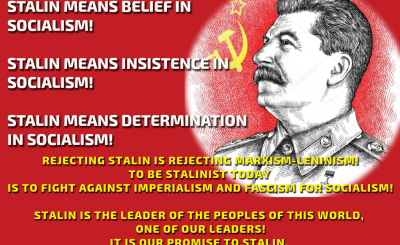Two months ago, we celebrated the 150th anniversary of the Manifesto of the Communist Party, written by Karl Marx and Friedrich Engels in Brussels. We reprinted the Communist Manifesto as a special issue of our theoretical journal Marxist Studies, with a long introductory article in which we examined, among other things, how Marx and Engels saw the socialist revolution as an international process. For each historical period, Marx and Engels were able to make a lucid analysis of the forces at work on the international scene, and of their interaction.
The Communist Manifesto and internationalism
In the writings of Marx and Engels, proletarian internationalism is already a fundamental issue as early as in the Manifesto. It sets the communist party apart from any other party: “In the various national struggles, the communists put forward those interests that are independent of nationality and that are common to the entire proletariat.”
In his famous Critique of the Gotha Programme (1875), Marx defends the principles of the Manifesto against nationalist currents. By then, the German party had already forgotten the prime principle: “the international fraternity of the working classes in their common fight against the ruling classes and their governments”. In the same period, Engels reminded his countrymen of this crucial task: “Above all, we should keep firm to the genuine internationalist spirit that does not allow patriotic chauvinism, of whatever kind, of whatever nation.” (Marx-Engels, Collected Works, 1883)
Marx and Engels have always pointed out to the workers of all countries that they should situate their struggle in the global context of the antifeudal and socialist revolutions and that their struggle should be made subordinate to the needs of these revolutions. They supported the struggle for national independence of any given people only inasmuch it could be seen as part of, or contributing to, the antifeudal and socialist revolution, and they opposed nationalist struggles if and when they played in the hands of feudal or bourgeois reaction.
Marx and Engels’ view on the future of the colonies
Some people attack Marx because of his supposed ‘Eurocentrism’. He would have concentrated his analysis on the capitalist countries and would have had a weak comprehension or even contempt for the majority of humanity living outside of Europe. Marx’ theories would have neglected Africa and Asia and would therefore not be applicable to these continents.
This allegation is, of course, untrue. More than anything, Marx was an internationalist. He stated that the violence of the bourgeoisie, while more or less camouflaged in the developed countries, is open and cruel in the colonies. “Bourgeois civilisation is exposing her deep hypocrisy and barbarism before our eyes, whenever she is transferred from her country of birth to the colonies: in the former, hypocrisy and barbarism take on respectable forms, in the latter they are operating without mask.” (Marx-Engels, Texts on colonialism, 1853) To give an example, Engels mocked the so-called ‘human rights’ the English colonisers were preaching to justify their intervention in China, and he unhesitatingly took sides with the Chinese ‘barbarians’ who used guerrilla tactics against the English. (Ibid., 1857)
But Marx and Engels’ support for the peoples of Asia and Africa was not the expression of a bourgeois humanism that cared about the beauty and purity of other civilisations. What they supported was the spirit of struggle and sovereignty of the oppressed peoples, while rejecting the feudal and pre-feudal relations these peoples were suffering from.
Marx and Engels scientifically examined the different forms the interaction between Europe and the colonies could adopt. In 1858, Marx posed the question of the impact of the capitalist development of Asia on the socialist revolution that was maturing in Europe: would socialism be able to hold out in this small corner of the world, while capitalism was advancing anywhere else?
Towards the end of his life, Engels put forward the hypothesis that the capitalist development of Asia would hasten socialist revolution in Europe and North America. The combined effect of massive migration and of the import of cheap products to the developed countries, could lead to a fatal crisis in the West. What Engels wrote about China, is most interesting: “This would be a brilliant irony of history: today capitalist production has only left China to conquer, but when this happens, the future of capitalism in its motherland would be compromised.The conquest of China by capitalism will lead to the downfall of capitalism in Europe and North America.” (Marx-Engels, Texts on colonialism, 1894)
The era of modern imperialism and socialist revolution
Since 1900 the world situation has been marked by the development of monopoly capitalism, the hunt for the last colonies, the bloody fight for the redistribution of the colonies and the neocolonies, and the rivalry on the world markets between the different imperialist powers. Lenin, continuing the work of Marx and Engels, analysed this phenomenon as imperialism, the highest stage of capitalism.
For the colonies and neocolonies, a new historical era began: that of the national and democratic revolution. The national question, the liberation from imperialist domination, became entangled with the social question, the liberation of the working class and the peasants. This national and social revolution was able to advance in a favourable international context, thanks to the existence of and the aid from the socialist Soviet Union and, later on, China.
Since the counterrevolution in the Soviet Union and Eastern Europe, imperialism has been able to strenghten its dictatorship over the Third World countries, who lost a strategic ally. But on a global scale, the anti-imperialist forces are stronger today than they were in the thirties.
The international character of the socialist revolutions to come
Today, the capitalist mode of production has penetrated almost the entire world. Private ownership of the means of production, wage labour and commodity production have become salient features of practically all economies in the world.
It is true that the capitalist world market was already established by the time of Marx. But the international character of capitalist production and exchange has known a tremendous development since the second world war. It is also true that feudal relations persist in many Third World countries, but this was also the case in Russia in 1917. Today more than ever, the democratic revolution must be led by the proletariat, and immediately upon the completion of the national-democratic revolution, socialist revolution must commence.
In the 1990s, large transnational corporations are realising turnovers and profits that are higher than the Gross National Product of many Third World countries. They plan their research, production and sales on a world scale. The IMF, the World Bank, the World Trade Organisation, the Multilateral Agreement on Investments currently being negotiated within the Organisation for Economic Cooperation and Development, the UN and the NATO are the instruments used by international big capital and the imperialist powers to impose their ever stronger and more brutal economic and political domination on all countries.
Within and outside these imperialist institutions, there is intense rivalry between the three main centres of imperialism: the US, Japan and Europe. The contradiction between imperialism and the Third World peoples and the inter-imperialist contradictions continue to provoke war, as against Irak, in Yugoslavia and in several former Soviet republics. The elements for a new world war are increasingly present. The crisis of the world capitalist system combined with the ferocious rivalry between the imperialist powers may lead the world to a third world war. But it is good to recall that the two great waves of socialist revolution in the 20th century took place at the end of the two world wars.
The future socialist revolutions will result from the economic, financial, political and military crises of the imperialist system.
The triumph of socialist revolution in a particular country can only be obtained using revolutionary politics that vigorously take into account all forces and factors that are at work in the international arena. Any such triumph will be the result of world revolution, of the revolutionary struggle of all workers and oppressed against their common enemies.
The victory of any socialist revolution can only be assured at the level of large regions – Western Europe or a significant part of it – or of countries as large as continents, such as Russia or India. A victorious revolution will only be able to consolidate and maintain her socialist character and her independence, if she fully supports the advance of the world revolution until final victory.
To say this, does not mean that the theory about the possibility of building socialism in one country is completely discarded. But the Marxist thesis of ‘socialism in one country’, as formulated and put into practice by Lenin and Stalin, is not a formula to be applied dogmatically and outside of its historical context. This ‘single country’ was no less than the immense Soviet Union, that had emerged from the war of intervention victoriously, in a historical situation in which the English, the French and the American bourgeoisie were no longer able to pursue their aggression. And this victory ‘in one country’ was also the result of the revolutionary struggles and uprisings in England, France and Germany, and could not be consolidated without the help of the international proletariat.
This is what Stalin had to say about it: “After consolidating its power and leading the peasantry after it, the proletariat of the victorious country can and must build socialist society. But does that mean that in this way the proletariat will secure a complete and final victory for socialism, i.e., does it mean that with the forces of a single country it can finally consolidate socialism and fully safeguard that country against intervention, which means against restoration? No, it does not. For this, victory of the revolution in at least several countries is needed. Therefore, the development and support of revolution in other countries is an essential task of the victorious revolution. Therefore the revolution which has been victorious in one country must regard itself not as a self-sufficient entity, but as an aid, as a means for hastening the victory of the proletariat in other countries.” (Stalin, Foundations of Leninism)
Conclusion
Undoubtedly, revolution in the 21ste century will be an international process, for which communists of all countries must prepare themselves thoroughly. We have the duty to instill proletarian internationalism in the political mass work in our countries. We must introduce the vanguard experiences of the struggles as well as the revolutionary ideas and positions of the international working class in the consciousness of the workers and the oppressed. And we must take the responsibility to work for the broad unity of the international communist movement, on a correct basis, i.e.: defending Marxism-Leninism, combating revisionism and upholding proletarian internationalism.




